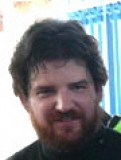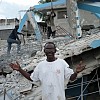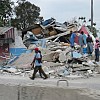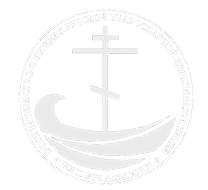"Members of the Haiti Mission are afraid of the future..."
Less than 24 hours after the first devastating earthquake in Haiti, former administrator of the mission, ROCOR deacon Fr. Matthew Williams of House Springs, MO was on his way there, intending to find out the fate of the ROCOR mission, the priests and parishioners. The Fund for Assistance, which sponsored the trip, and provided aid for the suffering church members in Haiti through Fr. Matthew, asked him to relive his experience in Haiti for our supporters.
FFA: Fr. Matthew, you are a father of large family. How did you feel about going to Haiti?
Deacon Matthew Williams: I have six children, ages one through nine years old. The quake happened Tuesday evening, on the 12th of January. By the 13th I couldn’t reach anybody there, and I just had to do something.
FFA: How did your wife react to your decision to go to Haiti?
DMW: She was entirely supportive of me, although terrified for my safety. While I was gone, she and the kids were definitely praying for me. Things went very well while I was there in terms of my safety and the safety of the people I was with, and I attribute that to the prayers of the Church.
The situation there is extremely dire. I could not begin to explain how difficult it is to someone who hasn’t been there. You can’t imagine it.
FFA: What shocked you the most?
DMW: I initially arrived in Port-au-Prince at night, through some of the worse affected areas. There was no power, the city was in darkness except for the light from the buildings on fire… Somehow I was spared from seeing the worst stuff that was seen on the news, but I did see some pretty terrible things. Blocks and blocks of buildings completely destroyed and on fire, it was really drastic going in at night.
There were large areas where there wasn’t a soul, just burned out cars. It looked like it was a combat zone, like it had been bombed. In other areas there were large groups of people, they were trying to put up tents, get some kind of shelter, sleeping on the streets.
That was my first impression, but not the most significant.
Personally I was most affected when I learned that one of our readers - Vladimir Randiche from the parish of the Nativity of the Theotokos in Port-au-Prince - almost certainly perished in the quake. Meeting with his wife and children, and seeing the impact on them… it was very difficult, I cannot imagine what they are going through. He has two children: Esther, six and Sebastian, five. His wife Madeleine, is 31. Seeing her suffering was very difficult. It really brought it home. About 150,000 people perished in the quake, and he is only one of them. But every soul is counted and it was especially hard because of him being a member of our parish. I was at his tonsure as a reader several years ago.
FFA: How were you able to meet with our clergy in Haiti?
DMW: I left for Haiti before I was able to reach anyone there. By the time I reached the Dominican Republic, I heard that both priests were alive. I had a phone number and Fr. Gregoire’s address. We entered Port- au-Prince late at night and were able to reach Fr. Gregoire by phone. He provided directions to our driver. It was very difficult to find the place, we kept driving along deserted streets, as well as streets packed with homeless people in the dark, late at night, trying to find the house.
Fr. Gregoire was waiting for us on the corner of the street, waiting for us. It was a real miracle that we found him: getting through the city (there are few street signs Port-au-Prince), the driver was from out of town; we drove through completely deserted areas. We’d heard reports that vehicles were being attacked and mobbed and looted.
That was a very emotional experience, finding Fr. Gregoire and matushka Rose May, and the children safe. He has one daughter, Anastasia and a child they care for – Crissy. They also live with matushka’s sister.
While preparing to travel into Port-au-Prince, I was wondering if we were going to be able to find his house and get out of there alive. That was some of the hardest times: the day we were getting into the city, and the preceding day, when we were getting the information from Haiti, a lot of rumors of Red Cross trucks being attacked, etc. I never saw any confirmation of this happening, but that’s what we were hearing in the Dominican Republic. There were times when I was concerned that I would not make it back. Once I was in Port-au-Prince and saw the real situation, that fear subsided.
FFA: Which parishes were you able to visit?
DMW: I was able to visit Fontamara, Jacmel, Port-au-Prince and Leogane.
FFA: What was it like meeting with our parishioners there?
DMW: The first parish I gathered parishioners together was in Jacmel. We had morning prayers with around 50 parishioners gathering in the chapel, which seems to be unaffected by the earthquake. I met with and spoke with them, assuring them that the Church is praying for them, that we are doing everything we can to provide aid to them.
A medical officer travelling with me, Lars Stuewe, treated a number of parishioners for wounds and injuries. Some of the injuries were serious; two parishioners had to be referred to a hospital. We had medical supplies that the Fund for Assistance had purchased for us, we were able to treat minor to medium injuries, sutures, etc.. As to anything that required long-term care, we couldn’t do. One of the parishioners seemed to have internal injuries after a significant fall – four stories - and he had not been to the hospital yet, but there was a functioning hospital in Jacmel.
FFA: How are the parishioners coping?
DMW: They didn’t say a lot, just answered my questions about food and shelter and water. Even the ones that have houses standing are afraid of going inside. A lot of people are living in camps. There are reports that food and water are freely available, but in reality many people cannot find it. It is available for purchase for those who can afford it, but not a lot of people can afford it. They are eating what they can find: coconuts and what not, and they are drinking water that should not be drunk.
In Leogane, where the church was completely destroyed, the parishioners live in two camps. The parishioners there already lived on one piece of property in a number of houses, and those houses are all gone. I think a lot of people are coping with this tragedy by trying to get on with their lives. They help each other; and try to provide moral and physical support.
FFA: Can they have any sort of church life at this time?
DMW: We had some services while we were there and I encouraged them to resume services as soon as possible for the sake of their spiritual well-being.
FFA: What emotional state are the parishioners in?
DMW: It’s very difficult to go on. The priests themselves are scared and traumatized. Fr. Jean has no home, no car, no school, so he can’t go on with his life. He can’t restart classes; there is nowhere to have them. Fr. Gregoire was with us when we were travelling, we were staying at his house, I hope that for him that helped him to focus on something, travel and visit the parishes.
Fr. Jean was with us part of the time; he is living at a neighbor’s house at the moment. The clergy they could be in a worst state, but they are not a 100% ok.
They are certainly traumatized, terrified of continued aftershocks – there have been 50 of 4.0 and greater. Many of the parishioners, even those whose homes withstood the earthquake, are sleeping outside out of fear. They are afraid of the future... what will happen when the rain comes?
FFA: What kind of aid to they need most?
DMW: The short term need is for food, water, medicine, and temporary shelter. In the long run, the mission hopes to construct permanent shelter (perhaps apartment buildings), rebuild the churches, and provide a permanent supply of clean water. To accomplish these goals, significant funds are needed. Donations should be made through the Fund for Assistance.
FFA: What are your next plans regarding Haiti?
DMW: With the blessing of His Eminence, Metropolitan Hilarion, I will participate in efforts to raise the funds for rebuilding and providing for the mission. Also, I will undoubtedly visit Haiti again in the near future. In short, I wish to do everything within my strength to help the Haitian people and our mission there.
FFA: Fr. Matthew, you are a father of large family. How did you feel about going to Haiti?
Deacon Matthew Williams: I have six children, ages one through nine years old. The quake happened Tuesday evening, on the 12th of January. By the 13th I couldn’t reach anybody there, and I just had to do something.
FFA: How did your wife react to your decision to go to Haiti?
DMW: She was entirely supportive of me, although terrified for my safety. While I was gone, she and the kids were definitely praying for me. Things went very well while I was there in terms of my safety and the safety of the people I was with, and I attribute that to the prayers of the Church.
The situation there is extremely dire. I could not begin to explain how difficult it is to someone who hasn’t been there. You can’t imagine it.
FFA: What shocked you the most?
DMW: I initially arrived in Port-au-Prince at night, through some of the worse affected areas. There was no power, the city was in darkness except for the light from the buildings on fire… Somehow I was spared from seeing the worst stuff that was seen on the news, but I did see some pretty terrible things. Blocks and blocks of buildings completely destroyed and on fire, it was really drastic going in at night.
There were large areas where there wasn’t a soul, just burned out cars. It looked like it was a combat zone, like it had been bombed. In other areas there were large groups of people, they were trying to put up tents, get some kind of shelter, sleeping on the streets.
That was my first impression, but not the most significant.
Personally I was most affected when I learned that one of our readers - Vladimir Randiche from the parish of the Nativity of the Theotokos in Port-au-Prince - almost certainly perished in the quake. Meeting with his wife and children, and seeing the impact on them… it was very difficult, I cannot imagine what they are going through. He has two children: Esther, six and Sebastian, five. His wife Madeleine, is 31. Seeing her suffering was very difficult. It really brought it home. About 150,000 people perished in the quake, and he is only one of them. But every soul is counted and it was especially hard because of him being a member of our parish. I was at his tonsure as a reader several years ago.
FFA: How were you able to meet with our clergy in Haiti?
DMW: I left for Haiti before I was able to reach anyone there. By the time I reached the Dominican Republic, I heard that both priests were alive. I had a phone number and Fr. Gregoire’s address. We entered Port- au-Prince late at night and were able to reach Fr. Gregoire by phone. He provided directions to our driver. It was very difficult to find the place, we kept driving along deserted streets, as well as streets packed with homeless people in the dark, late at night, trying to find the house.
Fr. Gregoire was waiting for us on the corner of the street, waiting for us. It was a real miracle that we found him: getting through the city (there are few street signs Port-au-Prince), the driver was from out of town; we drove through completely deserted areas. We’d heard reports that vehicles were being attacked and mobbed and looted.
That was a very emotional experience, finding Fr. Gregoire and matushka Rose May, and the children safe. He has one daughter, Anastasia and a child they care for – Crissy. They also live with matushka’s sister.
While preparing to travel into Port-au-Prince, I was wondering if we were going to be able to find his house and get out of there alive. That was some of the hardest times: the day we were getting into the city, and the preceding day, when we were getting the information from Haiti, a lot of rumors of Red Cross trucks being attacked, etc. I never saw any confirmation of this happening, but that’s what we were hearing in the Dominican Republic. There were times when I was concerned that I would not make it back. Once I was in Port-au-Prince and saw the real situation, that fear subsided.
FFA: Which parishes were you able to visit?
DMW: I was able to visit Fontamara, Jacmel, Port-au-Prince and Leogane.
FFA: What was it like meeting with our parishioners there?
DMW: The first parish I gathered parishioners together was in Jacmel. We had morning prayers with around 50 parishioners gathering in the chapel, which seems to be unaffected by the earthquake. I met with and spoke with them, assuring them that the Church is praying for them, that we are doing everything we can to provide aid to them.
A medical officer travelling with me, Lars Stuewe, treated a number of parishioners for wounds and injuries. Some of the injuries were serious; two parishioners had to be referred to a hospital. We had medical supplies that the Fund for Assistance had purchased for us, we were able to treat minor to medium injuries, sutures, etc.. As to anything that required long-term care, we couldn’t do. One of the parishioners seemed to have internal injuries after a significant fall – four stories - and he had not been to the hospital yet, but there was a functioning hospital in Jacmel.
FFA: How are the parishioners coping?
DMW: They didn’t say a lot, just answered my questions about food and shelter and water. Even the ones that have houses standing are afraid of going inside. A lot of people are living in camps. There are reports that food and water are freely available, but in reality many people cannot find it. It is available for purchase for those who can afford it, but not a lot of people can afford it. They are eating what they can find: coconuts and what not, and they are drinking water that should not be drunk.
In Leogane, where the church was completely destroyed, the parishioners live in two camps. The parishioners there already lived on one piece of property in a number of houses, and those houses are all gone. I think a lot of people are coping with this tragedy by trying to get on with their lives. They help each other; and try to provide moral and physical support.
FFA: Can they have any sort of church life at this time?
DMW: We had some services while we were there and I encouraged them to resume services as soon as possible for the sake of their spiritual well-being.
FFA: What emotional state are the parishioners in?
DMW: It’s very difficult to go on. The priests themselves are scared and traumatized. Fr. Jean has no home, no car, no school, so he can’t go on with his life. He can’t restart classes; there is nowhere to have them. Fr. Gregoire was with us when we were travelling, we were staying at his house, I hope that for him that helped him to focus on something, travel and visit the parishes.
Fr. Jean was with us part of the time; he is living at a neighbor’s house at the moment. The clergy they could be in a worst state, but they are not a 100% ok.
They are certainly traumatized, terrified of continued aftershocks – there have been 50 of 4.0 and greater. Many of the parishioners, even those whose homes withstood the earthquake, are sleeping outside out of fear. They are afraid of the future... what will happen when the rain comes?
FFA: What kind of aid to they need most?
DMW: The short term need is for food, water, medicine, and temporary shelter. In the long run, the mission hopes to construct permanent shelter (perhaps apartment buildings), rebuild the churches, and provide a permanent supply of clean water. To accomplish these goals, significant funds are needed. Donations should be made through the Fund for Assistance.
FFA: What are your next plans regarding Haiti?
DMW: With the blessing of His Eminence, Metropolitan Hilarion, I will participate in efforts to raise the funds for rebuilding and providing for the mission. Also, I will undoubtedly visit Haiti again in the near future. In short, I wish to do everything within my strength to help the Haitian people and our mission there.
Share This:
|




